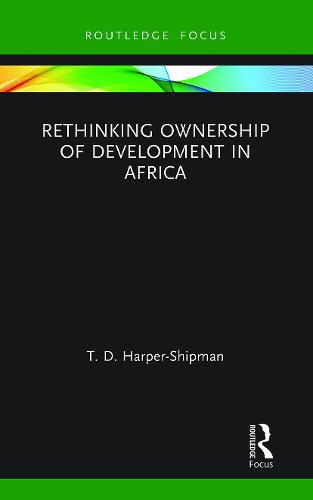Readings Newsletter
Become a Readings Member to make your shopping experience even easier.
Sign in or sign up for free!
You’re not far away from qualifying for FREE standard shipping within Australia
You’ve qualified for FREE standard shipping within Australia
The cart is loading…






Rethinking Ownership of Development in Africa demonstrates how instead of empowering the communities they work with, the jargon of development ownership often actually serves to perpetuate the centrality of multilateral organizations and international donors in African development, awarding a fairly minimal role to local partners.
In the context of today’s development scheme for Africa, ownership is often considered to be the panacea for all of the aid-dependent continent’s development woes. Reinforced through the Organization for Economic Co-operation and Development (OECD)‘s Paris Declaration on Aid Effectiveness and the Accra Agenda for Action, ownership is now the preeminent procedure for achieving aid effectiveness and a range of development outcomes. Throughout this book, the author illustrates how the ownership paradigm dictates who can produce development knowledge and who is responsible for carrying it out, with a specific focus on the health sectors in Burkina Faso and Kenya. Under this paradigm, despite the ownership narrative, national stakeholders in both countries are not producers of development knowledge; they are merely responsible for its implementation. This book challenges the preponderance of conventional international development policies that call for more ownership from African stakeholders without questioning the implications of donor demands and historical legacies of colonialism in Africa. Ultimately, the findings from this book make an important contribution to critical development debates that question international development as an enterprise capable of empowering developing nations.
This lively and engaging book challenges readers to think differently about the ownership, and as such will be of interest to researchers of development studies and African studies, as well as for development practitioners within Africa.
$9.00 standard shipping within Australia
FREE standard shipping within Australia for orders over $100.00
Express & International shipping calculated at checkout
Rethinking Ownership of Development in Africa demonstrates how instead of empowering the communities they work with, the jargon of development ownership often actually serves to perpetuate the centrality of multilateral organizations and international donors in African development, awarding a fairly minimal role to local partners.
In the context of today’s development scheme for Africa, ownership is often considered to be the panacea for all of the aid-dependent continent’s development woes. Reinforced through the Organization for Economic Co-operation and Development (OECD)‘s Paris Declaration on Aid Effectiveness and the Accra Agenda for Action, ownership is now the preeminent procedure for achieving aid effectiveness and a range of development outcomes. Throughout this book, the author illustrates how the ownership paradigm dictates who can produce development knowledge and who is responsible for carrying it out, with a specific focus on the health sectors in Burkina Faso and Kenya. Under this paradigm, despite the ownership narrative, national stakeholders in both countries are not producers of development knowledge; they are merely responsible for its implementation. This book challenges the preponderance of conventional international development policies that call for more ownership from African stakeholders without questioning the implications of donor demands and historical legacies of colonialism in Africa. Ultimately, the findings from this book make an important contribution to critical development debates that question international development as an enterprise capable of empowering developing nations.
This lively and engaging book challenges readers to think differently about the ownership, and as such will be of interest to researchers of development studies and African studies, as well as for development practitioners within Africa.